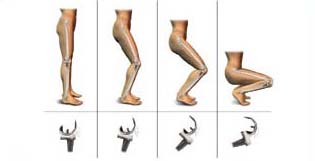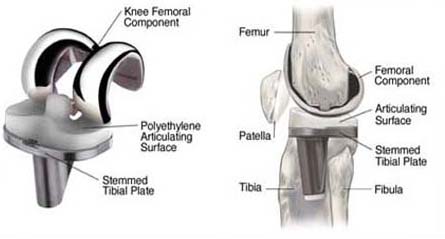Knee Replacement Surgery in India
For millions of people who suffer from osteoarthritis, pain has become a part of every day life. In some cases, total knee replacement may be the best option for relief. But many individuals may not take that step, fearing further limitations in their daily activities.
A new total knee replacement implant can help put those concerns to rest.
For patients with the ability and desire, the Flex Fixed Knee is designed to accommodate resumption of deep knee bending activities. Early diagnosis, good preoperative flexibility and appropriate rehabilitation (physical therapy) can help a patient's chance for success.
Arthritis in Africa
and Why African Patients Travel To India for Its Treatment 
 Phone / Whatsapp : +91-9371136499
Phone / Whatsapp : +91-9371136499
- A Higher Degree of Bending for Total Knee Replacement Recipients.
- The Surgery is Minimally Invasive Ensuring a Faster Recovery.
- A Leading Edge Treatment for Joint Replacements Patients.
- Patients can resume an Active Lifestyle after Total Knee Replacement
The Flex Fixed Knee replacement is the first knee specifically designed to safely accommodate flexibility of up to 155 degrees. Many activities of daily living require good range of motion, such as climbing stairs (75-140 degrees) and sitting in a chair (90-130 degrees). Hobbies such as gardening and golfing or activities such as kneeling for prayer and sitting cross-legged can demand an even greater degree of bending. Generally, knee replacements have been designed to accommodate flexibility up to 125 degrees.

What is the benefit of the Flex Fixed Knee?
The Flex Fixed Knee is specifically designed to safely accommodate up to 155 degrees of flexion in patients who had this ability before surgery. This means that with appropriate rehabilitation a patient can resume an active lifestyle after total knee replacement – deeply bending the knee for recreational, religious and other day-to-day activities. Patients today want to continue their previous lifestyles – even after total knee replacement. The Flex Fixed Knee may be an option for many patients to help them achieve this goal.

High Flex Knee Replacement - Surgical Procedure
The knee is the hinge joint consisting of three bones. The upper part of the hinge is at the end of the upper leg bone (femur), and the lower part of the hinge is at the top of the lower leg bone (tibia). When the knee is bent, the end of the femur rolls and slides on top of the tibia. A third bone, the kneecap (patella), glides over the front and end of the femur.

In a healthy knee joint, the surfaces of these bones are very smooth and covered with a tough protective tissue called cartilage. Osteoarthritis causes damage to the bone surfaces and cartilage where the three bones meet and rub together. These damaged surfaces can eventually become painful. There are several ways to treat the pain caused by osteoarthritis. One way is a total knee replacement surgery. The decision to have total knee replacement surgery should be made very carefully after consulting your doctor and learning as much as you can about the knee joint, osteoarthritis, and the surgery.

In some cases, the Flex Fixed Knee may be an option for total knee replacement. The basic surgical procedure for the Flex Fixed Knee is the same as for any other total knee replacement. In total knee replacement surgery, the bone surfaces and cartilage that have been damaged by osteoarthritis are removed and replaced with artificial surfaces made of metal and a plastic material. We call these artificial surfaces "implants," or "prostheses."
Knee Replacement Surgery Cost in India based on the type of surgery required in various countries in the chart / table are given below.
| Type of Knee Replacement Surgery | USA | UK | India | Thailand | Singapore |
| Total Knee Replacement Surgery | $50,000 | $40,000 | $4,000 | $5,000 | $6,000 |
| Partial Knee Replacement Surgery | $45,000 | $35,000 | $4,200 | $5,500 | $6,500 |
| Bilateral Knee Replacement Surgery | $35,000 | $25,000 | $7,500 | $9,000 | $11,500 |
| Minimal Invasive Knee Replacement Surgery | $22,000 | $18,500 | $5,500 | $6,600 | $8,500 |
| Revision Knee Replacement Surgery | $20,000 | $16,000 | $6,000 | $7,500 | $9,000 |
Getting to the Joint
The patient is first taken into the operating room and given anesthesia. After the anesthesia has taken effect, the skin around the knee is thoroughly scrubbed with an antiseptic liquid. The knee is flexed about 90 degrees and the lower portion of the leg, including the foot, is placed in a special device to securely hold it in place during the surgery. Usually a tourniquet is then applied to the upper portion of the leg to help slow the flow of blood during the surgery. An incision is then made that typically extends from just above the knee to just below the knee. The incision is gradually made deeper through muscle and other tissue until the bone surfaces are exposed.
Removing the Damaged Bone Surfaces
The damaged bone surfaces and cartilage are then removed by the surgeon. Precision instruments and guides are used to help make sure the cuts are made at the correct angles so the bones will align properly after the new surfaces (implants) are attached. Small amounts of the bone surface are removed from the front, end and back of the femur. This shapes the bone so the implants will fit properly. The amount of bone that is removed depends on the amount of bone that has been damaged by the osteoarthritis. A small portion of the top surface of the tibia is also removed, making the end of the bone flat. The back surface of the patella (kneecap) is also removed.

Attaching the Implants
An implant is attached to each of the three bones. These implants are designed so that the knee joint will move in a way that is very similar to the way the joint moved when it was healthy. The implants are attached using a special kind of cement for bones.The implant that fits over the end of the femur is made of metal. Its surface is rounded and very smooth, covering the front and back of the bone as well as the end. The implant that fits over the top of the tibia usually consists of two parts. A metal baseplate fits over the part of the bone that was cut flat. A durable plastic insert is then attached to the baseplate to serve as an articulating surface between the baseplate and the metal implant that covers the end of the femur. The implant that covers the back of the patella is also made of a durable plastic. Artificial knee implants come in many designs. The surgeon will choose the implant design that best meets the patient's needs.
Knee Implants After Attachment
Closing the Wound. If necessary, the surgeon may adjust the ligaments that surround the knee to achieve the best possible knee function. When all of the implants are in place and the ligaments are properly adjusted, the surgeon sews the layers of tissue back into their proper position. A plastic tube may be inserted into the wound to allow liquids to drain from the site during the first few hours after surgery. The edges of the skin are then sewn together, and the knee is wrapped in a sterile bandage. The patient is then taken to the recovery room.
Below are the downloadable links that will help you to plan your medical trip to India in a more organized and better way. Attached word and pdf files gives information that will help you to know India more and make your trip to India easy and memorable one.
Go to the Enquiry Form
Phone Numbers Reach Us
India & International : +91-9860755000 / +91-9371136499
UK : +44-2081332571
Canada & USA : +1-4155992537
 Apollo Hospital
Apollo Hospital Fortis Hospital
Fortis Hospital Artemis Hospital
Artemis Hospital
 Medanta Hospital
Medanta Hospital



 Jaslok Hospital
Jaslok Hospital Lilavati Hospital
Lilavati Hospital

 Global Hospitals
Global Hospitals Jupiter Hospital
Jupiter Hospital













